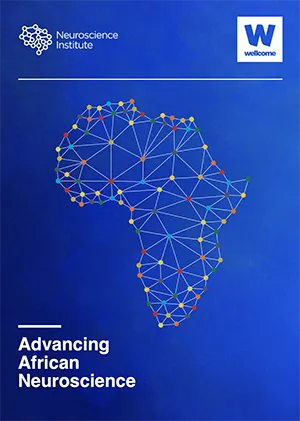
The purpose of the Showcasing African Neuroscience meeting was to facilitate a dynamic and interactive stakeholder engagement process that would: highlight the best examples of research in basic and clinical African neuroscience, explore the potential for enhancing the connection between these fields in the African research context, and draw attention to the significant potential for new discoveries from those closest to the health challenges on the continent.
Our aim was also to showcase the potential for health impact by expanded investment in neuroscience in Africa, and more broadly, to provide an opportunity to engage with a variety of stakeholders on strategies for accessing existing funding pipelines, while also facilitating informal discussions around some of the additional opportunities emphasised in this report.
As a global organisation, the Wellcome Trust supports research on a wide range of topics and looks for potential areas of growth and opportunity within research communities worldwide. The potential in the African neuroscience research landscape was identified as one such area. Through informal conversations and a survey of African neuroscientists, and with generous input and assistance from other groups already well-embedded in this landscape (e.g. SONA and IBRO), the concept for a strategic, forward-thinking meeting was born.
The guiding principle was that the African neuroscience community would lead the engagement process, with support provided by Wellcome. Following the meeting, a series of workshops has drilled further into the issues raised, starting discussions on how best to address them, and ultimately working towards increased investment from all stakeholders, institutions, researchers, and funders. This report builds on these discussions. In it, we highlight early advances in neuroscience research in Africa, and outline a framework for further developing the capacity of African neuroscience to explore the unique challenges facing brain health and development on the continent.
View the full report
View the eLife publication
Kirsten A Donald, Mahmoud Maina, Nilesh Patel, Carine Nguemeni, Wael Mohammed, Amina Abubakar, Matthew Brown, Raliza Stoyanova, Andrew Welchman, Natasha Walker, Alexis Willett, Symon M Kariuki, Anthony Figaji, Dan J Stein, Amadi O Ihunwo, William Daniels, Charles R Newton (2022) Science Forum: What is next in African neuroscience? eLife 11:e80488
Other relevant global neuroscience reports and strategies:
-
Optimizing brain health across the life course: WHO position paper
Brain health is a rapidly expanding field. WHO’s position paper on optimizing brain health across the life course is a technical complement to the recently-adopted Intersectoral global action plan on epilepsy and other neurological disorders 2022–2031.
Many determinants are known to affect brain health at different stages of life. The position paper provides a conceptual framework for what brain health is and how brain health can be optimized throughout life with actions across the following clusters of determinants: physical health, healthy environments, safety and security, learning and social connection, and access to quality services. Optimizing brain health can not only reduces the prevalence and burden of neurological disorders, but also improve mental and physical health overall and create positive social and economic impacts, all of which contribute to greater well-being and help advance society, irrespective of the presence or absence of disorders.
Find the position paper here
